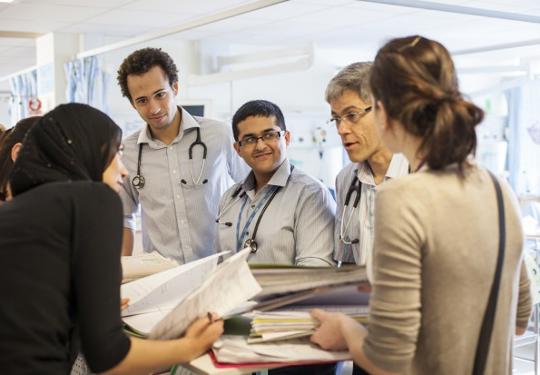By Dr Helen Yandell FRCP, associate specialist in acute medicine and college tutor at Yeovil Hospital.
I qualified in 2003, and spent a year on the Isle of Wight doing house jobs. I then moved to Yeovil in 2004 and have stayed here since. I completed a 3-year SHO training programme, but was then adversely affected when the Medical Training Application Service transitioned to Modernising Medical Careers, and there were far fewer specialty registrar posts than there were applicants. I tried general practice for 9 months in Scotland, but I felt this was a disaster – I was not born to be a GP! I was offered a job back in Yeovil; they wanted someone to work 9am – 5pm on the Acute Medical Unit. Trainees were so often away from the ward, on-call, on nights or away on leave that there was limited continuity of care. I came back as a ‘middle grade’ to offer this consistency, and this slowly developed into my Associate Specialist role. I am now also the clinical service lead for acute medicine.
Since 2016, I have been an accredited educational and clinical supervisor via the Severn Deanery and I have been involved with various postgraduate educational projects at the trust. I became a college tutor in August 2019 and associate training programme director for general internal medicine in January 2020. In Yeovil we have two IMTs and six higher grade trainees annually, and I facilitate the educational provision for both these groups, including regional training days.
In September 2020, we set up a formal scheme for trainees, SAS and trust grade doctors requiring performance support. We have also set up a scheme for all new international doctors starting in the trust. These innovative schemes facilitated the early identification of colleagues who required help with technical, or professional generic skills. We take referrals from educational and clinical supervisors and we monitor the recruitment email updates for new starters as well. After the initial assessment meeting we develop an individually tailored program to address areas that they are struggling in or need to develop. We then organise further one-to-one sessions, mostly as simulation based teaching and mentoring events. We also organise extra shadowing weeks if needed, and put these colleagues initially on wards where there is a continual consultant presence, for example AMU. We also use our support team to assist doctors not in training to develop their career progression. Feedback from this scheme is incredibly positive and we aim to expand this program in the future.
Along with another associate specialist, we have designed a monthly training and leadership programme for specialty and associate specialist doctors. The sessions are available for SAS doctors in our hospital and that of the neighbouring trust. Our SAS colleagues provide a significant amount of service provision within the NHS, but are often overlooked from training and leadership perspective. They also nurture the doctors in training in many hospitals therefore their education and support is equally important.
We also have a monthly simulation programme for the trust fellows and have implemented weekly ward based simulation for the MDT including physician associates, nursing staff and therapy team. We hope that this will help to start to redress the training imbalance but also motivate more of our colleagues to get involved in senior hospital leadership.
Read more inspiring SAS doctor stories in the latest issue of Commentary, the membership magazine.





